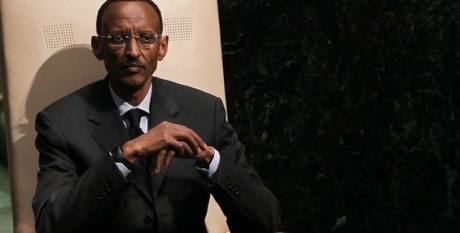No aces left? Pressure piling up on Gen. Kagame
Says Left Unpunished Will ‘Embolden’ Kigali Regime
Congressman Ed Royce (R-CA), Chairman of the House Foreign Affairs Committee, has written a sharply-worded letter to Secretary of State John Kerry calling for a re-evaluation of U.S. relations with Rwanda given the recent attacks on regime critics outside the country.
The Congressman says the U.S. shouldn’t again miss the “signs of political dysfunction and repression” that led to the “genocide in Rwanda” in 1994 and called for reassessment of aid to the Gen. Paul Kagame regime.
He deplored the killing of exiled former Rwanda spy-chief Patrick Karegeya and the three attempts on the life of Gen. Faustin Kayumba Nyamwasa, in South Africa.
Rep. Royce condemned statements by President Kagame following the killings.
He said, “Allowing President Kagame’s violent rhetoric and the slaying of dissidents abroad to go unchecked will only embolden the regime.”
The letter to Secretary Kerry, dated March 11 reads:
I am writing to express my deep concern over the numerous attempted attacks and killings of Rwandan dissidents living outside that country. Any functioning and responsible democracy allows the voices of opposition to be heard. Yet in Rwanda there is a systematic effort to silence – by any means necessary – the voices of those who question the regime in Kigali.
As you know, Patrick Karegeya, a prominent Rwandan opposition figure and former high ranking government official, was killed in South Africa earlier this year. Last week, armed gunmen attacked the home of another popular Rwandan opposition figure in South Africa, Faustin Kayumba Nyamwasa.
This latest attack marks the third assassination attempt against Kayumba in recent years, and has led to the expulsion of Rwandan diplomats from South Africa. Paul Ruseabagina, the well-known Rwandan humanitarian and anti-genocide activist, has told me of attempts to intimidate and threaten him. Karegya’s murder and the numerous assassination attempts on Kayumba are just the most recent examples of the many Rwandan dissidents who have been killed, exiled, tortured, and unjustly imprisoned over the years.
Rather than condemning targeted attacks against popular opposition figures, President Paul Kagame publicly celebrates them, many times falling just short of taking personal credit. Even while denying accusations of official involvement in the Karegeya assassination, President Kagame told the press, “I actually wish Rwanda did it. I really wish it.” Consistently in public remarks, President Kagame indicates that there will be “consequences” for those who question his authority. During an official visit to Rwanda by Maina Kiai, a U.N. Special Rapporteur tasked with examining a country’s freedom of peaceful assembly, found that “peaceful public disagreement with the [Rwandan] government is equivalent to criminality.”
I appreciate the State Department condemnation of President Kagame’s remarks and expressions of concern about the “succession” of politically motivated murders of prominent Rwandan exiles. Yet, President Kagame’s actions are louder than our words. Legitimate opposition figures rightly fear for their lives. Allowing President Kagame’s violent rhetoric and the slaying of dissidents abroad to go unchecked will only embolden the regime. Toward that end, I encourage you to closely reevaluate U.S. engagements with Rwanda and take into account these troubling actions when considering future assistance.
While I am cognizant of the strategic role Rwanda’s security forces play in peacekeeping missions throughout the continent, this should not blind us to the regime’s attempts to violently close the political space for opposition voices.
As we prepare to mark the twenty year anniversary of the genocide in Rwanda – which claimed the lives of over 800,000 people in just three months and sparked a regional conflict that has yet to be resolved – the friends of Rwanda must ensure that we do not, once again, miss the warning signs of political dysfunction and repression. I appreciate your attention to this matter and look forward to working with you to ensure that Rwandan dissidents can speak freely without fear for their lives.












